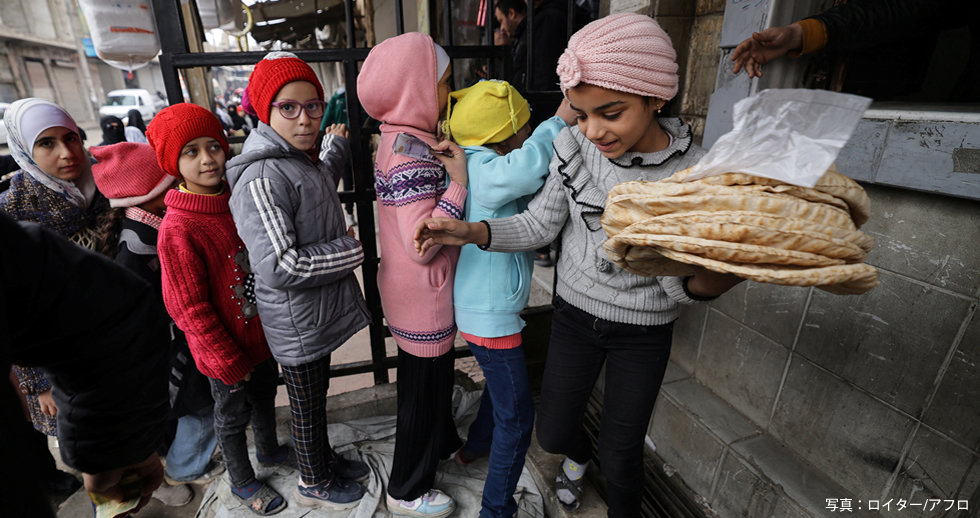The purpose of "JIIA Strategic Comments" is to provide timely and easy-to-understand commentary and policy-relevant analysis from JIIA researchers and others on important international affairs issues.
- Al-Assad regime in Syria fell on December 8th so quickly after 54 years of dictatorship only 11 days after the start of attacks on November 27 by Hay'at Tahrir al-Sham (HTS) led by its leader Abu Muhammad al-Joulani. Syrian people burst into their utmost jubilation with tears while Russia and Iran were forced to retreat from Syria where they enjoyed their presence as backer of al-Assad regime.
- Now a new Syria waits for an uncertain future with the hold of power by rebel fighters led by HTS. How will a new Syrian government be formed under a strong influence of HTS and what policy option does the international community have vis-à-vis a new reality on the ground? Moreover, what is the strategic implication of the event of December 8 in Syria over the future of the region?
- Futoshi Matsumoto, Executive Director of the JIIA and former Chargé d'Affaires of Japanese Embassy in Syria between 2015 and 2019 presents his analysis with policy suggestions at this critical juncture in Syria.
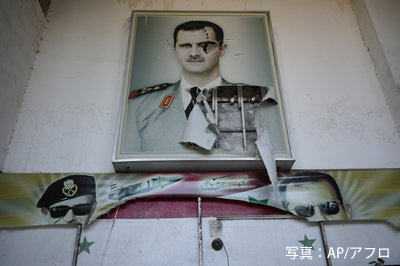
Facts:
The fall of Bashar al-Assad in Syria on Dec. 8, 2024 led to the takeover of power in the hands of Hay'at Tahrir al-Sham led by its leader Abu Muhammad al-Joulani, now called Ahmed al-Sharaa. The event led the withdrawal of Iranian Revolutionary Guards and its allies such as Iraqi militias from Syria and made all Russian military presence shrunk into two military bases in the coast of Syria while Israel advanced into Syrian Golan Heights and beyond, having declared that the disengagement agreement has become null and void and Türkiye increased its political presence in Syria through its continued engagement with various former Syrian oppositions including HTS itself.
Although this article does not directly address a question of how and why this extraordinary event developed so quickly while leaving it to a number of other updated reports,1 it is safely presumed that a weakened position of Iran and Hezbollah in Syria after having being attacked by Israel particularly in Lebanon, coupled with Russian military engagement in Ukrainian war since 2022 and Russian decision not to continue to provide air-cover for Syrian Arab Army (SAA) against HTS as well as damaged moral, weakened loyalty and economic destitute amongst Syrians, brought by international sanctions made easy a rapid collapse of Syrian military and security apparatus vis-à-vis rapid advancement of determined rebels.
The former opposition or "Syrian Salvation Government" which ruled Idlib in the past seven years was brought into Damascus to form an interim government under Muhammad Bashir, former Prime Minister of the Salvation Government in a relatively orderly manner. This interim government is scheduled to last until March 1 as caretaker government. Additionally, Ahmed al-Sharaa, a new leader of Syria tries to give an impression of moderate political rule in his western attire, carefully avoiding any problematic issue of Islamic jurisprudence that may contradict the will of the majority of Syrian people and foreign sceptics.2
The international community including Türkiye, Qatar, Saudi Arabia, US, EU, UK, Germany and France in started to directly communicate with this new Syrian interim government led by Ahmed al-Sharaa. However, it is rather premature to predict how quickly the western governments may recognize formally a new Syrian government nor lift their sanctions against Syria. Russia and Iran put into a rather awkward situation after December 8 are closely watching evolving situation with a minimum or no formal contact with the new interim Syrian government.
Despite of the fall of al-Assad regime, Syria remains divided into different regions: a vast area under HTS or a new Syrian interim government, the northeast of Syria under Kurdish forces under YPG/PYD or the Syrian Democratic Forces (SDF) with the support of US forces, the northern territories of Syria including Afrin, Jarabulus and Manbij under de facto Turkish control with support of Syrian National Army (SNA) and the southwest of Syria including Syrian Golan Hights, Western Damascus and a part of Daraa bordering Jordan with the presence of IDF under de facto Israeli control.
Meanwhile, the U.S. Central Command continues to work to prevent the militant group from reestablishing a foothold by striking them in the middle of Syrian desert after the fall of Damascus. Instability in Syria continues to prevail in pockets of lands. Continued clashes between SNA and the SDF in northern Syria represent this reality. With disappearance of a central power in Damascus, such regional instability seizing the moment of power vacuum in Syria is rather unavoidable.
From an Asian angle, it is also worth noting that North Korean diplomats left Damascus as soon as Bashar al-Assad is gone.3 Long-standing cooperation between Syria and North Korea including weapons of mass destruction came to an end. How China may develop its relations with a new Syrian government is also worth watching as HTS advanced into Damascus together with Uyghur fighters of Turkistan Islamic Party (TIP) whose goal is to establish an Islamic State in Xinjiang and Central Asia. China regards TIP as synonymous with the East Turkestan Islamic Party.
Questions:
Syria now faces an uncertain future with a new reality on the ground, brought by the demise of Bashar al-Assad and the rise of HTS and its Islamist allies into power. To better predict the future of Syria and the region with full of inconvenient truths hidden under the surface, the following salient questions should be answered clearly both by Syrian people and the international community to seek for a right direction, overcoming huge challenges on the way ahead:
Will the new Syrian interim government allow other former opposition parties of various groups to participate in a free and democratic process to form a new Syrian government that is supposed to be inclusive of all elements of the Syrian society? Moreover, how could social and communal divisions in Syrian society turn into an inclusive political system in a much broader sense?
Other foreign governments will support this internal process of Syrian-led democracy? What would be a role of Türkiye and U.S. two major powers in particular? At the same time, what will be the policy of Russia and Iran in dealing with the future government of Syria? Could they officially recognize a new Syrian government that may be composed of "terrorists" in accordance with their original description before December 8?
Along with these questions above, is a new Syrian government able to regain their territorial integrity and sovereignty over all Syrian lands anytime soon? Will Türkiye give up its hold on a strip of territories in the northern border of Syria before it may dismantle the presence of YPG/PYD that Türkiye considers as terrorists. Would Israel decide to withdraw one day from large areas of the southwestern Syria, that it rapidly occupied after December 8 under the pretext of safeguarding Israeli security?
Another murkier point is that many elements of former Syrian Arab Army (SAA), particularly its Alawi fighters that supported the Assad regime could be contained by HTS and its allies?
Will the West be able to swiftly lift or at least suspend a variety of sanctions against a new Syria so that a new Syrian government could assure Syrian people in their dire humanitarian needs of a better life and speedy reconstruction of the country despite of aid fatigue prevailing particularly in the West?
A new Syria will not be another springboard for terror like Afghanistan? Shall Salafi-Jihadi elements including non-Syrian fighters, who originally composed HTS and other former armed opposition parties would not pose any danger to the international community in the near future in addition to residual ISIS members in Syria, that may seize a chance of political and security vacuum to rise and expand again?
Lastly, given that Syria now tilted toward more Sunni-Islamist orientation with members of HTS and its allies as de facto new ruler of Syria while Iran and Russia lost its political and military influence over Syria in contrast to the increased sense of security felt by Israel in the region, what would be the future of the region out of this dramatic sea change in the regional dynamism?
Analysis:
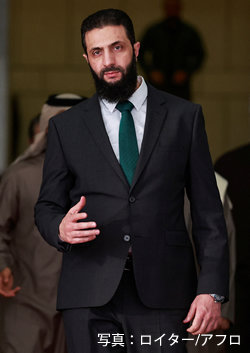
First, whether HTS could succeed in forming an inclusive government of different Syrian political movements and civil society remains the biggest question. And whether such a government would be recognized as legitimate representative of Syrian people by foreign governments is another major question.4
Appointment of Muhammad al-Bashir, former Prime Minister of the Syrian Salvation Government in Idlib as new interim Prime Minister, nomination of a couple of governors such as in Damascus suburb, Aleppo and Latakia from members of Ahrar al-Sham, a hardcore Islamist ally of HTS. In fact, HTS's past record of self-rule in Idlib does not augur well for the establishment of a future national government as it never showed any inclusiveness for other political parties in its local rule. Instead, HTS crashed any opposition to its rule by forces of oppression.5 Suspension of the Syrian Constitution for three months to allow a legal and human rights committee to propose amendments, do not bode well either for such an optimistic scenario. It does not seem that even any member of the former legitimate oppositions who participated in UN-led negotiations in Geneva was ever consulted by HTS for this critical transitional political process.
There has been an idea of launching a comprehensive national dialogue in which all segments of Syrian society are expected to join to set in motion the transition process after March 1.6 If such a step will be taken in a transparent and accountable manner with participation of all political parties, it can be interpreted certainly positive as this transitional phase will be very critical to All Syrian people.
However, given my personal experiences in Geneva with all Syrian oppositions of different backgrounds, it is rather difficult to expect that various Syrian political groups would reach a quick consensus on any political step. At the same time, it is also hard to imagine that HTS and their fellow Islamists will willingly cede their power to other political parties.
Moreover, a variety of social and communal rifts and divisions that exist in Syrian society have become deeper and wider even compared to that of the year 2011. It will take many years for such a divided society to come up easily with a consolidated political system just as Iraq in the post-war period from 2003 continues to struggle with its own democracy.7
Second, a number of foreign governments have already contacted HTS and showed their willingness to cooperate with the HTS-led interim government. However, US and European countries are not explicit in immediately lifting their sanctions against Syria and openly mention that it is up to actions of HTS in the coming phase. Although both Russia and Iran have been contacting with HTS to safeguard their interest such as presence of Russian military bases and sanctity of Shia shrines such as Sayyeda Zainab, their future engagement with Damascus remains uncertain.
Meanwhile the political role of Türkiye has become critical at this juncture as it has kept strong relations with various Syrian oppositions for the past years. A series of high-level visits to Damascus by Turkish dignitaries such as Ibrahim Kalin, head of Turkish intelligence and Hakan Fidan, Turkish Foreign Minister after the fall of Bashar al-Assad signifies how important the role of Türkiye is in shaping the future of a new Syria.
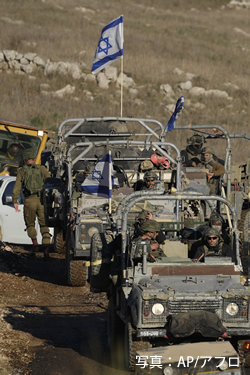
Third, although Assad regime collapsed, it does not mean that Syria has now returned to what it was before 2011. What remains unchanged is that Syria continues to be geographically divided by different powers, and it is far from being united politically either. Just like al-Assad regime was extremely vulnerable to external influences, a new Syria remains to be even weaker than the previous regime. The curse of geostrategic location of Syria surrounded by stronger neighbors continuously dominates the drama that will be developed after December 8.
Three major players continue to play significant roles inside Syria: namely Israel, Türkiye and US after expulsion of Iranian Revolutionary Guards coupled with members of Hezbollah and Iraqi militias in addition to retreat of Russian military personnel to two bases in Latakia and Tartous. How this question of unification of divided Syrian lands could be solved remains to be seen.
As soon as the fall of Assad regime was confirmed on December 8, 2024, Israel Defense Forces (IDF) carried out around 480 strikes across all Syria in two days, hitting most of Syria's strategic weapon stockpiles. At the same time, the IDF immediately entered the buffer zone under UN control in Golan Heights with the instruction of Prime Minister Netanyahu to safeguard the security of Israel even by occupying a strategic location of Mount Hermon or Jabal al-Shaykh, that looks over both Lebanon and Syria. Moreover, the IDF advanced into the western part of Damascus so close to the Syrian capital, well within the artillery range of the IDF.
In responding to such actions, UN and regional countries criticized such Israeli moves as violating the international law, including an Israeli unilateral abandonment of the Agreement on Disengagement with Syria signed in 1974. Additionally, Israel took also control of Al-Wahda Dam on the Yamouk river reservoir near al-Qusayr in Daraa Governorate, which provides for around 30% of Syria's fresh water and 40% of fresh water supply for Jordan.
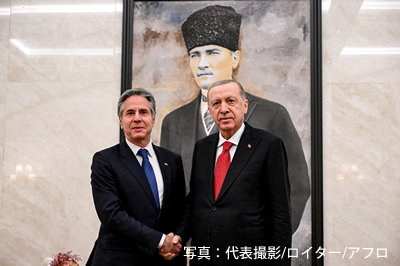
Türkiye also secured a strip of lands along the border of Syria and Türkiye with the help of the Turkish-backed armed opposition or Syrian National Army (SNA), now focusing on the area of Kobani that remains under the control of YPG/PYD. Türkiye obviously considers them as terrorists. Türkiye rejects the presence of these Kurdish elements under YPG/PYD to participate in any future government of Syria. At the same time, it is rather unthinkable either that YPG/PYD will relinquish their control of expanded lands in the northeast of Syria after the departure of the Syrian Army from some areas such as Deir el-Zor. In this regard, continued negotiations between Türkiye and US are critical to bring about even a temporary stability in the northern Syria as US remains eventually the sole guarantor for survival of YPG/PYD even after the fall of al-Assad regime.
Fourth, how minorities of Syria may react to the rule of HTS with its Islamist ideology also remains to be seen. The Alawite community in Latakia and Tartous has not shown yet any sign of resistance and even people in Qardaha where al-Assad family is originated have so far shown a conciliatory attitude vis-à-vis HTS.
Meanwhile, some elements of the former Syrian Arab Army appeared to be hiding in some parts of Syria and declared their firm stand against HTS. An incident of loyalists to the Syria Arab Republic mounting an armed resistance on Dec.20 against HTS in the town of Talfita in the north of Damascus may be a start of turmoil after the fall of al-Assad regime. Additionally sporadic violences between elements of HTS and its allies and minorities including Alawites have begun to surface in social media.
Moreover, the vast segments of secular Syrian society in major cities in contrast to conservative social class that may support HTS-ruled Syria would surely assert themselves if the HTS-centered interim government may carelessly introduce any policy along the line of Islamist orientation.
Fifth, although HTS called upon foreign governments to lift their sanctions against Syria and Ambassador Geir Pedersen, UN Special Envoy for Syria urged suspension of sanctions, it seems until today that US and European countries would like to wait for a while by making it a condition that actions and deeds of HTS in its governance would be subject to certain international scrutiny and standards.
Syria needs massive reconstruction assistances in the long run in addition to immediate humanitarian assistance needed for majority of its population. The country's GDP has shrunk over 80% since 2011 while 90% of its population live under the poverty line. The question of balancing the speed of lifting sanctions and overseeing appropriate political transition by the international community is tantamount to exposing many lives of ordinary Syrians living under poverty line to risk of survival.8 It is imperative for the international community to be reminded that human security continues to be at risk in Syria even after al-Assad is gone.
Sixth, this question above is particularly pertinent to another one. That is, whether the rule by HTS in Syria would be conducive to the rise of terrorism led by some Salafi-jihadi elements within the ranks of HTS and its allies. Obviously, the record of the HTS shows that its self-rule in Idlib proved that HTS had certainly fought the most dangerous ISIS elements and had largely purged transnational Salafi-jihadi elements from its ranks during the past seven years and transformed itself into more Syria-oriented national group. However, they kept a certain alliance with some foreign elements such a unit of Xhemati Alban calling themselves "Albanian Tactical"9 and Uyghur fighters of TIP (Turkistan Islamic Party).10
In fact, we have seen many highly trained foreign elements who fought together with HTS have now surfaced in Damascus. They include many Europeans, Central Asians and Uyghurs.11 For example, it is pointed out that French fighters were placed by HTS into the battle fronts between Hama and Homs before the fall of Damascus.12 Those foreign elements may enjoy a newly created a safe haven in Syria, leading to possible negative reactions from major Gulf countries such as Saudi Arabia and UAE with a new Syrian government under strong influence of HTS. It is also interesting to observe how China may react to the presence of Turkistan Islamic Party composed of Uyghur fighters.
Seventh, if the major strategic turnaround in the region can be safely summarized as victory of Israel and defeat of Iran and Russia, the question that we should ask particularly at this juncture is how long Iran could keep its strategic patience vis-à-vis Israel after having been weakened by the loss of a number of its allies and proxies such as Hamas, Hezbollah and al-Assad regime this time.
If Iran may decide to fully develop its nuclear weapons, having sharply sensed a loss of its deterrence against Israel, it will certainly lead to determined actions of Israel against various Iranian nuclear facilities once again to destroy such capability.
There is no doubt that resumption of repeated missile attacks by Houthis against Tel Aviv is closely linked with the situation in Syria. Additionally, it is worth watching how the Islamic Resistance in Iraq under a heavy influence of Iranian Revolutionary Guards may behave under the current situation.
Policy Suggestions:
Given the enormous challenge of political transitions in Syria, both Syrians and the international community should work together taking into consideration the following points:
HTS and its allies in power should be acutely aware of a risk of alienation by the Syrian society that is so diverse and not so easy to accept Islamist political agenda of HTS. Even if HTS may try to force it to others, the Syrian people are not so amenable. In the possible national dialogue if it will be held, HTS should navigate very carefully to include all representatives of the society and to create more inclusive government representative of the whole society. If HTS will not be savvy enough in this political process, there will be a serious backlash from Syrian people themselves as they cannot afford to have another disillusionment after 54 years of dictatorship.
The international community needs to leverage its recognition of a new Syrian government and humanitarian and reconstruction support to Syria so that HTS and its allies will opt for a transparent and accountable democratic transition process in the spirit of the principles of Security Council Resolution 2254, which leads to credible, inclusive, and non-sectarian governance. The future government must ensure respect for the rule of law and human rights, including women's rights. It also needs to provide protection to all Syrians, including religious and ethnic minorities.
The presence of the United Nations in Syria led by UN Special Envoy should be fully utilized to support such process. Ideally this may require an update on UNSC resolution 2254 to reflect a new political reality. However, given a continued dysfunction of the United Nations Security Council due to disagreement amongst its permanent members, it may be advised for the UN to continue on the basis of the current UNSC resolution 2254 to call upon all Syrian stakeholders to seek for an inclusive dialogue to establish a new legitimate Syrian government in the future Efforts of the UN in Syria should be also focused on immediate humanitarian actions on the ground.
Foreign powers that are currently present on the soil of Syria need to agree with a new Syrian government on their modality of presence if their presence is needed by a new Syrian government and its people. If not, all these foreign powers should respect the sovereignty of Syria and withdraw from Syria without delay from the internationally recognized territory of Syria. Without due respect to territorial integrity of Syria, the war in Syria will never end. Regarding this question, the intentions of three countries that keep their military presence in Syria, namely Türkiye, Israel and US will determine the future of Syria eventually.
Presence of particularly foreign elements amongst HTS and its allies being designated as terrorists by the international community should be a serious subject of discussions between a new Syrian government and the international community not to let Syria become another springboard for terrorism in the future. If an amicable resolution will not be found, new leaders of Syria should be aware that it is less likely that they would receive expected assistance from foreign donors.
As soon as a legitimate Syrian government is established, the international community is urged to participate in supporting Syrian-led reconstruction efforts, leading to safe return of Syrian refugees and displaced people back to their home. Some western countries may not be in a position to strongly support such efforts because of their fatigue in foreign assistance. However, their policy integrity in the past 13 years may be tested in this post-conflict period if they would not fully live up to their past commitment.
Particularly for Europe, this question of rebuilding a stable and prosperous Syria is deeply connected to the question of safe return of so many Syrian immigrants settled in Europe. It is imperative for European countries to balance their commitment to help rebuild Syria and a risk of keeping many Syrian immigrants in Europe.
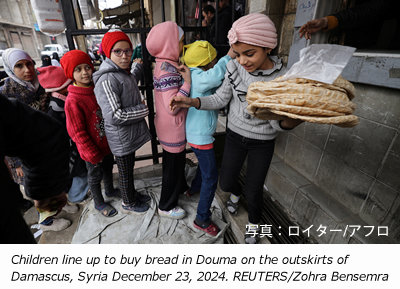
Japan has been continuously supporting the Syrian people through different UN agencies and NGOs during the most difficult time of the conflict from its perspective of safeguarding human security in whole Syria, covering a wide range of fields including capacity building in all fields, education, health and even preserving Syrian cultural heritage. Such Japanese approach and commitment in humanitarian and early recovery efforts have been deeply appreciated by Syrian people.
Particularly Japan's long-standing cooperation in the field of electricity at major Syrian power stations is noteworthy.13 Power stations such as Jandar and al-Zala were originally provided to Syria by Mitsubishi Heavy Industry through concessionary JICA loans in 1990s and maintained even during the conflict through a close Japan-UNDP cooperation as a part of early recovery assistance.14 Japan's continued support for sustaining electricity in Syria, being coupled with financing assistance from Gulf countries may merit serious study as a first step to rebuild necessary infrastructures in Syria.
Lastly, it is imperative to recognize the increased severity of the regional situation. The Middle East has become even more put on fire after December 8. A sole victory of one party could bring about temporary peace. However, it cannot be sustained for a long time unless others will be forced to keep silence. A new dynamism launched by the fall of al-Assad and the rise of HTS in Syria may risk dragging all regional players into even harder contest. The international community should not sit idle even for a moment but support Syrians to stand on their own without letting any spoiler, whoever it maybe, to take a chance.
[end]
1 Followings are some of examples on the fall of al-Assad regime: https://www.washingtonpost.com/world/2024/12/21/syria-rebels-assad-iran-turkey/
2 BBC interview with Ahmed al-Sharaa is exemplary of the moderate tone of the new Syrian ruler.
Syrian rebel leader calls for sanctions to be lifted | BBC News
6 Washington Returns to Damascus with High Stakes for Syria's Transition | The Washington Institute
سوريا الجديدة... و"الخطيئة السودانية" | مجلة المجلة
7 This writer was in Baghdad as Ambassador of Japan to Iraq until this November and witnessed at a close distance still-nascent Iraqi democracy even 21 years after the fall of Saddam Hussein. Compared to Iraqi experiences after 2003, it is rather premature for anyone to expect that a new Syrian democracy would quickly function in a short period of time after 54 years of the authoritarian regime by Alawite minority grown out of now defunct ossified socialist Ba'athisme.
8 A number of experts point out the importance of the immediate humanitarian and economic assistance to a new Syria including the following articles:
https://www.foreignaffairs.com/syria/path-better-syria?check_logged_in=1
https://www.foreignaffairs.com/syria/how-hold-syria-together
9 Xhemati Alban is a jihadist formation composed of ethnic Albanian fighters from Kosovo, Albania, North Macedonia, and the Presheva Valley (southern Serbia) and many of them are well trained snipers.
https://www.rferl.org/a/syria-hts-tajikistan-northmacedonia-kosovo-albania/33237636.html
13 https://reliefweb.int/report/syrian-arab-republic/undp-and-japan-agree-expand-support-restoring-access-electricity-syria
14 This writer was engaged in planning continued assistance to maintain provision of electricity through UNDP, covering whole Syria including the Northwest between 2016 and 2019 in coordination with different stakeholders.

